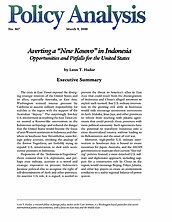The crisis in East Timor exposed the diverging strategic interests of the United States and its allies, especially Australia, in East Asia. Washington resisted intense pressure by Canberra to assume military responsibility for stability in the region with the support of the Australian “deputy.” The surprisingly low-key U.S. involvement in resolving the East Timor crisis averted a Kosovo-like intervention in the Indonesian archipelago and reduced the danger that the United States would become the focus of anti-Western sentiment in Indonesia and elsewhere in Southeast Asia. Nevertheless, some foreign policy activists, invoking the analogy of the former Yugoslavia, are foolishly trying to expand U.S. intervention to deal with secessionist pressures in Indonesia.
Proponents of the “Indonesia-is-Yugoslavia” thesis contend that U.S. diplomatic, and perhaps even military, activism is a moral and strategic imperative to pressure Indonesia’s Javanese political elite to recognize the right of self-determination of Aceh and other provinces. An assertive U.S. role, it is argued, is needed to prevent the threat to America’s allies in East Asia that could result from the disintegration of Indonesia and China’s alleged intention to exploit such turmoil. But U.S. military intervention in the growing civil strife in Indonesia would only encourage secessionist movements in Aceh, Maluku, Irian Jaya, and other provinces to refrain from reaching with Jakarta agreements that could provide those provinces with more political autonomy. Such agreements have the potential to transform Indonesia into a more decentralized country without leading to its Balkanization and the onset of civil war.
Moreover, high-profile U.S. military intervention in Southeast Asia is bound to create incentives for Japan, Australia, and the ASEAN governments to maintain their current “free-riding” policies. Instead, a more detached U.S. military and diplomatic approach, including support for a constructive role by China in the region, would encourage Beijing, Tokyo, Jakarta, and other key players to create an environment conducive to a stable regional balance-of-power system.

This work is licensed under a Creative Commons Attribution-NonCommercial-ShareAlike 4.0 International License.
